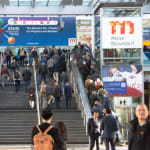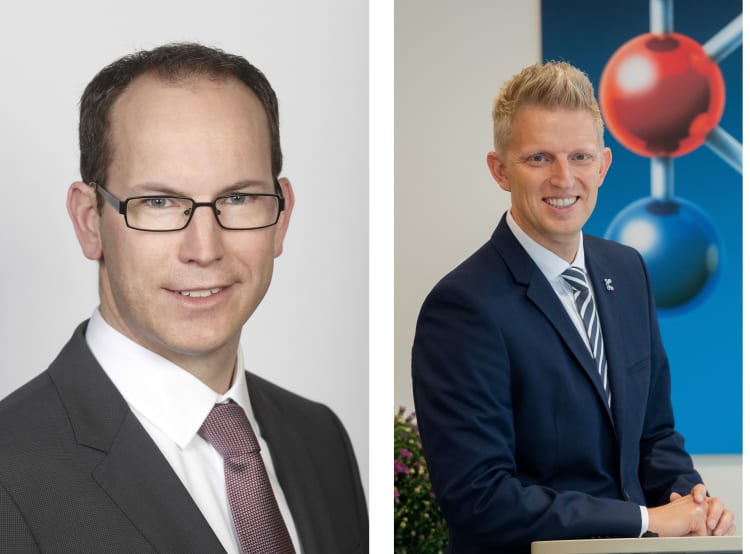
Interview with Thomas Dohse, project director of interpack and Thomas Franken, project manager of the K Trade Fair.
Things like K and interpack trade fairs are really unique. Both of these events are considered the biggest in their industries. And one company is responsible for both events. So it is natural to ask, where is the secret of success?
T. Franken: Yes, the K show is big, but it´s all about quality, not only quantity. With K, we offer the worldwide plastics and rubber industry its leading trade fair and its most important information and business platform. Exhibitors and visitors from all continents come together and use the opportunities offered by their flagship fair to demonstrate the industry’s capabilities, discuss current trends and set the course for the future. Only at K, can visitors experience and compare such a varied and international range of innovations, solutions and high density of product launches. K underscores its special position not only through its popularity with the global industries but also by addressing the current challenges of our era and especially of its sector.
T. Dohse: The same applies to interpack for the packaging branch and the related processing industries. Being established in the 1950’s both, interpack and K have a long history and always put a lot of effort into being as close to the industry as possible. We work very closely with worldwide associations, organizations and specialists in the industry. Anticipation has always been one of the decisive prerequisites for the continuous success of a leading international trade fair. Just as the plastics and rubber industry as well as the packaging and processing industries continue to develop dynamically, K and interpack do too – for instance with special exhibitions on important topics today and the future.
T. Franken: In addition to the flagship fairs in Düsseldorf, we are present in other parts of the world with our global portfolios for K and interpack, offering business and communication platforms in important growth markets and regions. Messe Düsseldorf is thus a door- and gate-opener for successful business for companies around the globe.
The second question is also very obvious. What are your feelings when you recall last year?
T. Dohse: It is logical that as trade fair organizers our hearts bleed when the exhibition halls have to remain empty where otherwise face-to-face business is conducted, hundreds of thousands of people from all over the world meet and present their innovations live.
Due to the Covid-19 pandemic, Messe Düsseldorf closed the business year 2020 with a loss, but thanks to sound and sustainable management over the past years, the company has created financial leeway which is having a positive effect for managing the current situation. Furthermore, the company counters the current pandemic with a powerful package of measures.
T. Franken: , We have expanded our business model by developing digital formats for example. Last November, around 45,000 trade visitors from 169 nations participated in virtual.MEDICA and virtual.COMPAMED; in addition, there were 1,500 exhibitors from 63 countries. Industry players from all over the world were able to network even in times of COVID-19. But of course, the realisation of live events in our exhibition halls is always our focus. The economy urgently needs trade fairs. It needs platforms for presenting, gathering information, exchange and networking and – most important - face to face communication. And we are very optimistic that our trade fair business will ramp up again in the second half of 2021.

Thomas Dohse, project director of interpack (left) and Thomas Franken, project manager of the K Trade Fair (right)
And what is the situation in Germany nowadays? In Poland, fairgrounds have been turned into temporary hospitals
T. Dohse: Fortunately, no additional temporary hospitals have had to be set up in Germany so far, medical care in Germany is very good, there are also enough beds in intensive care units in German hospitals, but even here the medical staff has had to work at peak performance for over a year, so one can only pay tribute and thank them again and again.
T. Franken: In some cases, vaccination centres have been set up in German trade fair halls. In Düsseldorf, however, the vaccination centre is not located on our exhibition grounds, but in the sports Arena, located right next to Messe Düsseldorf.
What is the nearest future of the exhibition industry? And what long-term consequences can we expect?
T. Dohse: At the moment, the pandemic does not yet allow us to return to live events in the exhibition halls, many trade fair companies are working on digital formats. As far as Messe Düsseldorf is concerned, our virtual events attract a broad-based international audience. The recent example is our virtual.drupa, which ended successfully after four days on 23 April 2021. Digital events like this allow industry players from around the world to network, find out about industry trends and forge partnerships, even in times of Covid-19.
T. Franken: Also, virtual commitments will pay off after the pandemic. There is a trend towards combining physical and digital formats. For our trade fairs this means that they will be increasingly complemented by virtual content. We focus on developing hybrid trade fairs – i.e. a mix of the physical event on site and digital ranges. This will consolidate the pole position of Düsseldorf’s global No. 1 trade fairs as central communication and business platforms for their respective industries – during the physical trade fairs and throughout the whole year.
T. Dohse: Trade fairs have always had to keep up with the times, adapt to changes in the world and the industries involved. This also includes modifying, supplementing and permanently optimising formats for exhibitors and visitors. The pandemic caused very sudden changes and challenges that the trade fair industry is ready to face. And one thing became very clear in times of social distancing: We as people are social beings and want to meet each other in order to establish and foster relationships as well as to build trust. This is the basis for business and can not easily be replaced by digital alternatives.



